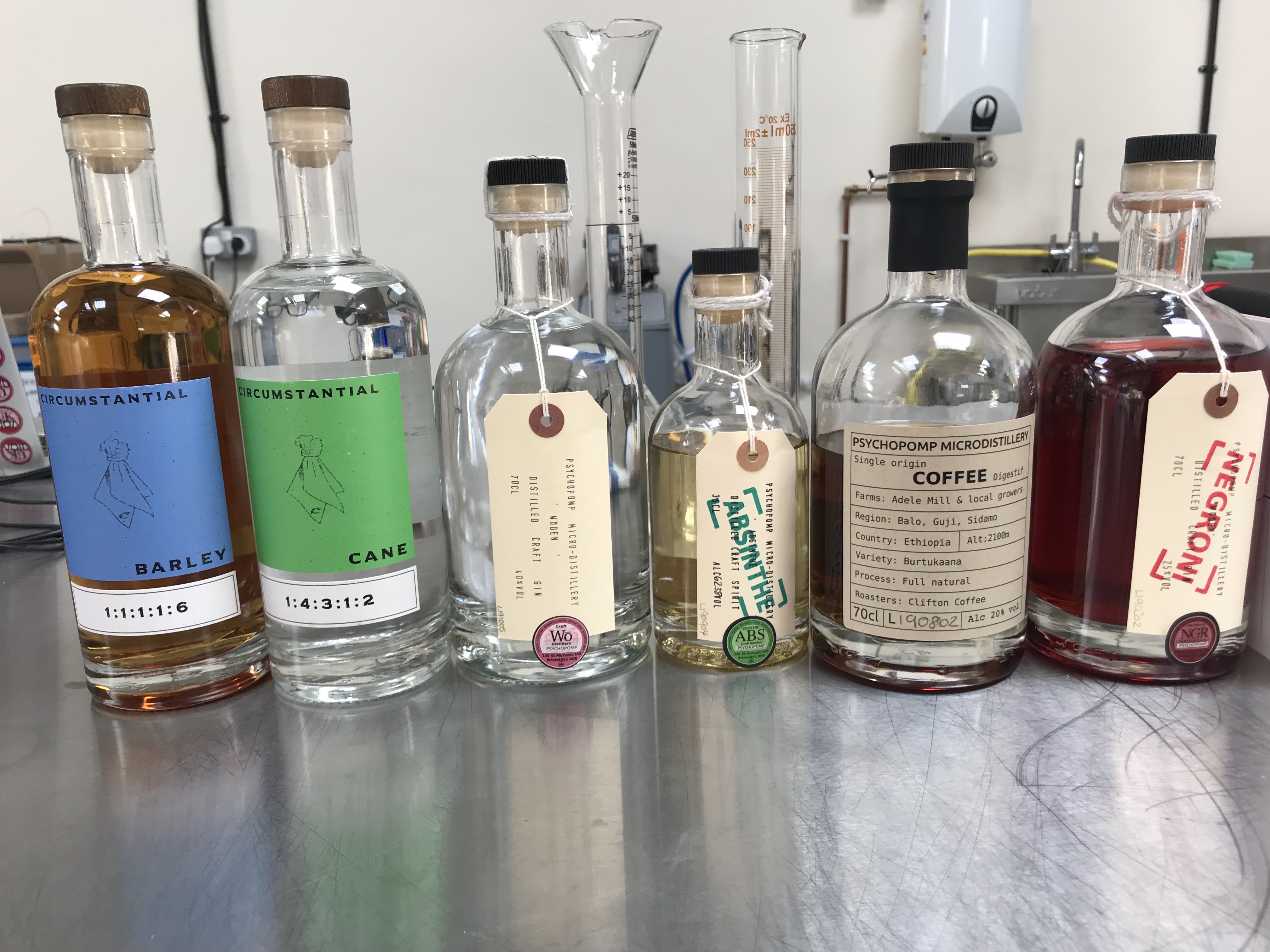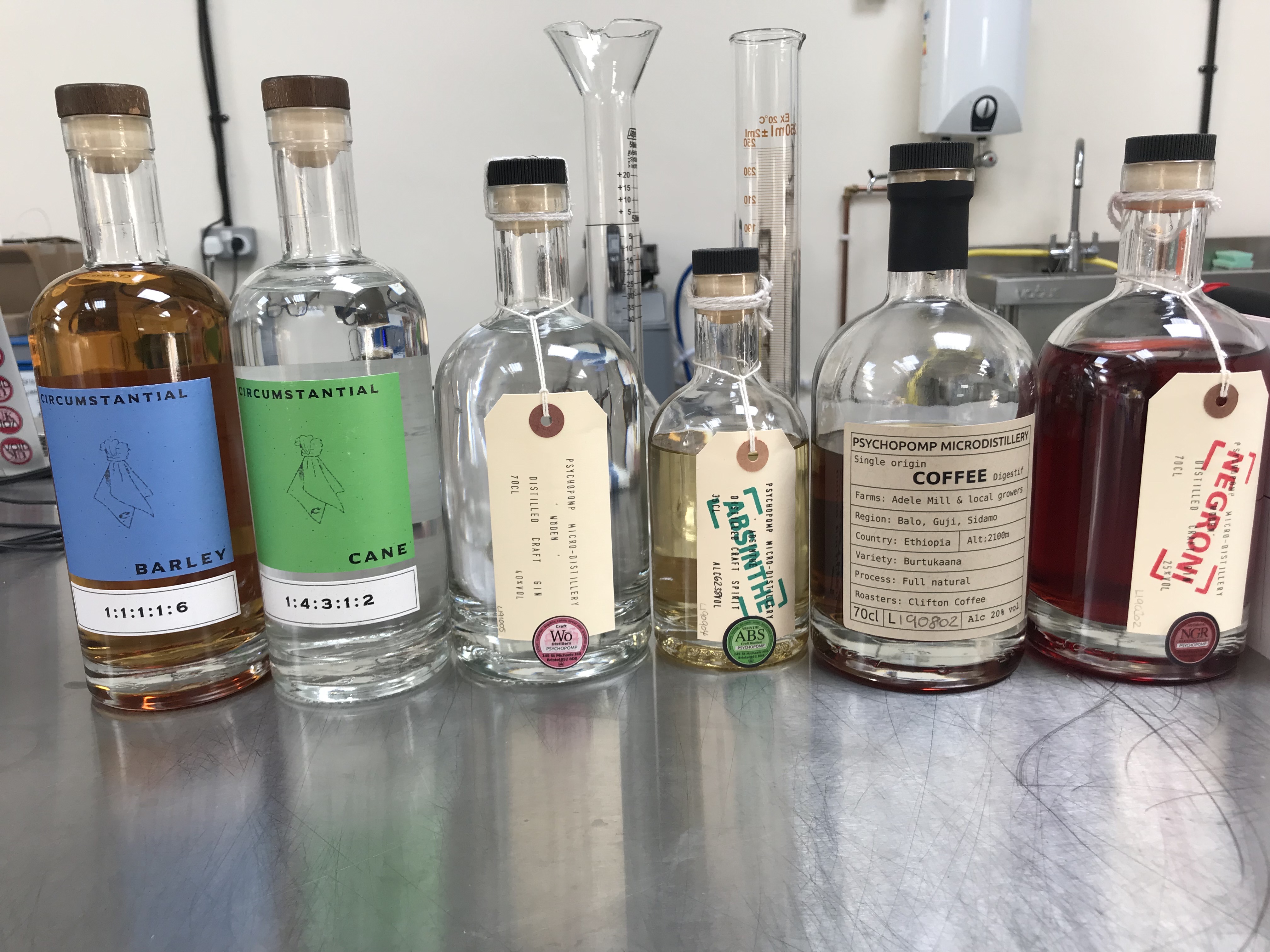A spirit of adventure at the heart of the Bristol drinks scene!
Sitting in a London restaurant talking about the spirit world might sound like a new-age hobby. However, the only otherworldly aspect of Bristol’s Circumstance Distillery is the uniqueness of their story!
Circumstance is a truly modern and innovative distillery. They specialise in ‘new world’ grain and cane spirits, pushing the boundaries of what’s possible without any ghostly intervention! Ryebeck recently caught up with co-founders, Danny Walker and Liam Hirt, to learn about their story and plans for the future.
Psychopomp and Circumstance
Liam, a full-time cardiologist and Danny, who has a background of cocktail bar management, are the creators of the successful Psychopomp Microdistillery. This is the first licensed producer of spirits in Bristol since the Blitz. Hobby distillers for several years, they initially made gin in the basement of Liam’s house on a hand-made 5L still. Then, as their gin improved and became better known, a local wine merchant asked to stock it and so the business began to flourish.
Liam and Danny bought their first premises in central Bristol, installing two 30L copper lambic stills. With the gin scene developing rapidly, the new distillery’s popularity and reputation grew largely through word of mouth. Starting with a London Dry, they then introduced seasonal limited edition gins every three months and tried out many new recipes. Their yearning for experimentation with grain and cane spirits plus an interest in global trends made them consider upscaling their business. That’s where the inspiration for Circumstance was born.
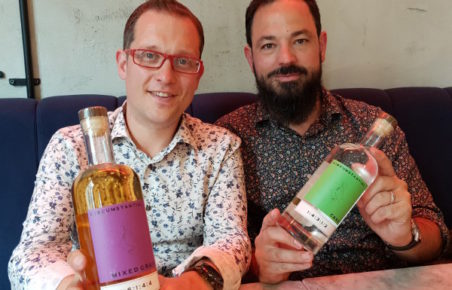
Danny Walker and Liam Hirt
New beginnings
Liam describes the unorthodox beginnings of their new journey. “There were two things we wanted to accomplish when we launched the distillery. One was to generate cash to secure our cash flow. The other was to bring all our great customers through Psychopomp on board with us as we went through the various iterations of the grain spirits we were making and all the experimental stuff we had in the pipeline. The way we decided to do that was issuing our own cryptocurrency. We wanted people to have the opportunity to be involved with whatever Circumstance was doing. So we produced a digital token, which can be traded or exchanged for any bottle at any point in time.”
Launching with a cryptocurrency
Danny comments that the first set of tokens (only 3000 were issued) went on sale for £30 each, whereas the cheapest bottle they’ve released from the distillery so far is £38. “With everything we’ve done and plan to do, a large part is about fun and interest. Liam’s really into cryptocurrencies and technology so that was an angle we could play in. How many people get to create their own currency, have fun with it, sell it to people and use it as a tool? We did it because we wanted to and we can!”
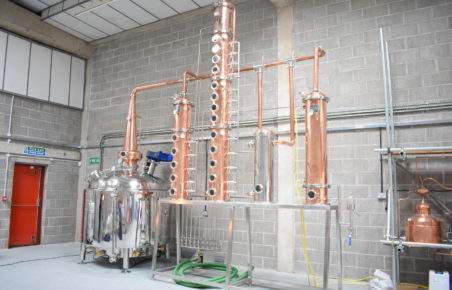
Hybrid still at Circumstance Distillery
Larger premises and a new still
The success of Psychopomp had allowed the business partners to take on a new, much larger site and extend the contract distilling side of their business. However, it was the installation of a 1800L hybrid pot-column still that enabled them to pursue their aim of making contemporary grain and cane spirits. Danny describes further. “It’s a pot still with a whisky hood, 4-plate whisky column, 12-plate rectifying column, a gin basket and a condenser. We started distilling there last September and our first product was Circumstantial Barley which went to market in April this year.”
Installation of the huge still was far from easy and typically unorthodox. “We put the still together by hand from bit parts and a photo! We could lift some columns into place between three or four of us. However, the tall column was so heavy, we had to put a strap round it, throw that over a beam and tie it to Liam’s car. We then drove out of the distillery to lift it up, so we could put it into place!”
Underpinning their commitment to the Bristol drinks scene, they work with a local brewery, Dawkins, to mash the grain. The mash is then transported back to Circumstance Distillery where the yeast is pitched and fermentation begins.
Low slow ferment
Their first product is made from 100% malted barley, fermented at low temperature for 13 days on a mix of French saison yeast and distillers yeast. “The saison yeast“, explains Danny, “is essentially for slowly building flavour and fruit notes. It creates something interesting, sour, funky, big, bold and vibrant. The distillers yeast is added later on to eat up the sugars that the saison yeast can’t. There’s a single distillation through the pot and 4-plate column and the spirit is then matured, using a charred English oak spindle carved by a local wood expert.”
Charred oak spindle imparts wood flavour
The use of charred oak spindles is not new, as it’s already practised in the USA. “We experimented with different charred levels until we found the one that gave us the best flavour“, says Danny. “We liked the idea and decided to see how we could do it ourselves using English oak, working with a local craftsman and creating something that would impart wood flavour on to our distillates.”
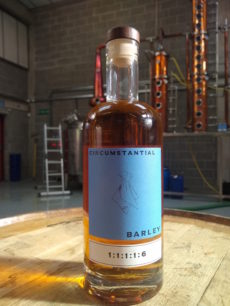
Circumstantial Barley
Circumstantial Barley (45% ABV)
The barley spent two months in an inert container with the wood spindle inside it to impart wood flavour. It was then transferred to a first-fill bourbon cask for four months. “The point was to make a delicious raw spirit packed full of flavour and then not do too much to it with the ageing“, adds Liam. “The spindle gave us wood flavours on top of fruity flavours and then resting in barrel finished off the quick maturation with some aeration.”.
“We won’t release anything we don’t want to drink neat”, adds Danny, “but Circumstantial Barley is great for a highball with soda or ginger ale. It has big grain notes like a shochu, wood notes like a whisky and raw fruit notes like agricoles and some tequilas.”
Circumstantial Mixed Grain (42% ABV)
Their second release is predominantly a wheat spirit. It’s fermented on Bavarian wheat yeast, which brings out funky fruit notes, before finishing off with distillers yeast. The spirit is aged in 30L chestnut barrel which impart creamy, soft, caramel notes. This is then blended with Circumstantial Barley and also some rye spirit which has been fermented with a mead yeast and aged in bourbon casks. The result is a complex mélange of many different flavour notes.
300 bottles of the Mixed Grain spirit were made, compared to 250 bottles of the Barley. These will be repeated but will differ from the original launches as new ways of fermentation, distillation and maturation are explored.
Circumstantial Cane (45% ABV)
They have also now released a rum, the first ever to be legally distilled in Bristol. This is made from 100% South American molasses using a 20-day ferment and dunder pits to encourage what Danny refers to as “big funky flavours“. Distillation through the pot and 4–plate column follows and the resultant spirit is rested for two months in first fill bourbon casks. It’s then distilled through the pot and 12-plate column. “The first distillation gave big funky banana, pineapple, Jamaican flavours“, says Danny. “It was bold and raw and we loved it! We wanted to make something that was a little more cocktail-focused, so the second distillation gives it almost a Cuban finish – dry and citrusy but with all that big banana funk up front.”
Unique labelling
All bottles from the Circumstance Distillery will bear the ‘Circumstantial’ name, labelled with a special code that changes for each release. One of the meanings of circumstantial is to have a full description. “We’re big on transparency and openness“, comments Danny. “The website allows consumers, who want to find out more information, to get all the details by checking the code. We are committed to complete disclosure without ramming it down people’s throats!”
Research in maturation
Maturation remains a key area of interest and experimentation for these innovative spirits producers, as Liam explains. “We are working with the University of the West of England (UWE) Materials Department. There are two aspects to maturation: aeration and adding wood. With the spindles we get very good wood flavours coming through, but we’re not getting the aeration. So we rest the spirit in barrels to encourage aeration and finish it off. We’re looking at other ways to accomplish this, taking inspiration from winemakers and some brewers.
We’ve started working with UWE on clay – using clay amphorae for ageing in combination with wood spindles. They’re making the amphorae for us. We’ve decided on the design and various thicknesses, using various clays and that way, we’ll introduce air. We’ll probably introduce some minerality and presumably the clay will vary this depending on which clay we use. We’ll still be adding the wood through the spindles.”
The essence of ‘new world’
So what does it mean to make ‘new world’ spirits?
For Danny, it’s “the freedom to do whatever we want to produce, unlike wine which is more geographical. It’s about exploring flavour. In America, many of what we would describe as new world spirit producers are brewers, building flavour through fermentation and starting to experiment with distillation. We’d never say a single bad word about Scotch whisky or Bourbon because we drink a lot of both and they’re incredible but we want to put our own stamp on it and make something new and different! It’s the same in every industry – there’s heritage, tradition and new stuff. Scotch whisky companies are innovating, but within boundaries and rules, while we’re innovating outside of these because we can. We’re asking questions at every stage of the process. The modern drinker wants liquid and not titles. It’s about making things that taste great that people want.”
“With maturation, we looked at barrels and what they did and thought ‘how do we keep all the vibrancy, funk and flavour?’ We want to add wood and oxygen to create maturation, viscosity and mouthfeel. So we started working with clay pots. What we’re developing with UWE is a signature clay pot with a certain type of clay roasted to a certain profile of bake. It has either a clay or a wooden lid with the spindle mounted on to it. Therefore, as a whole vessel, it imparts the flavour of the wood, breathes with the oxygen through the clay and creates minerality from this material.”
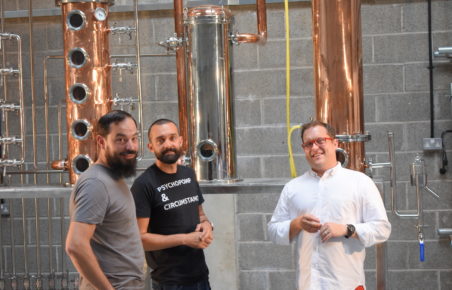
Liam (l) and Danny (r) with Head Distiller Mark Scott in the middle
Experimentation and the future
They’re experimenting with different woods for the spindles, including hickory, beech and cherry and are also looking at different-sized barrels and seasonings. For example, they have already seasoned separate bourbon casks with Guatemalan green coffee beans and Chinese tea leaves for new rye spirit releases.
Barley, rye, corn, oat and wheat spirits are in various stages of production and ageing methods. They’re even looking at potentially distilling some mead and perhaps making a fortified mead. “There’s no limit as to what we may do“, stresses Liam.
Bespoke bottles
At Psychopomp, they continue to make gin and the distillery has a popular bar, events and tasting area. With two 30L stills, they can make 21L or 30 bottles of gin at a time. Therefore, they work with other businesses and individuals, making bespoke bottles. One project included producing a lemon zest, thyme and British black truffle gin for a local steak restaurant. They also produce gins for special events. “We’ve produced over 100 gin recipes in the last 14 or 15 years“, adds Danny. “We can work with people who want something for a birthday, wedding or a gift of just two or three bottles.”
An exciting road lies ahead
Bristol is a city with a vibrant food and drink culture. Psychopomp and Circumstance are two distilleries linked by people with a vision to produce innovative, contemporary spirits that appeal to the modern drinker’s sense of adventure. Their journey is only really just beginning. A fun and exciting road surely lies ahead.
Circumstantial spirits are sold via the company’s website, but are also available in pubs, bars, restaurants plus selected independent bottle shops and online retailers, including Master of Malt.
Author: Robin Goldsmith of The Write Taste
